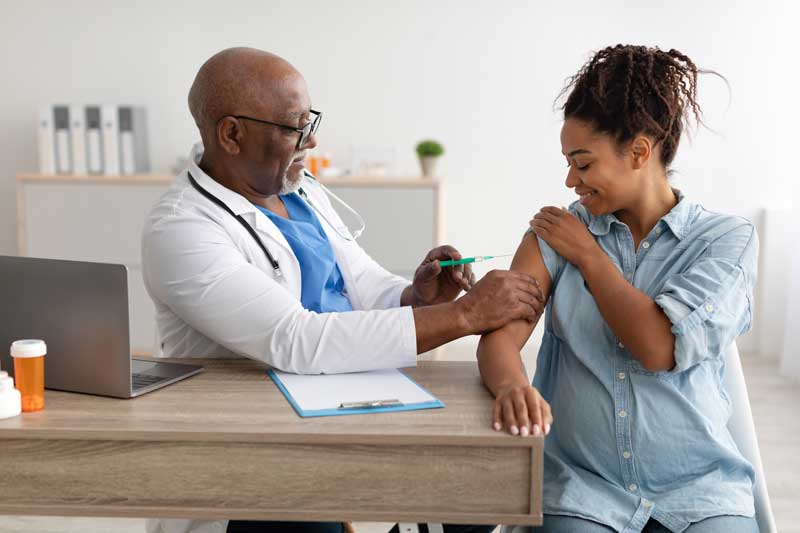 The Wellness Coalition has focused efforts on increasing both breastfeeding and COVID-19 vaccination rates in our community. We’ve learned there is a lot of misinformation about both topics circulating throughout the River Region. Continue reading for evidence-based details about COVID-19 vaccines for pregnant and breastfeeding women.
The Wellness Coalition has focused efforts on increasing both breastfeeding and COVID-19 vaccination rates in our community. We’ve learned there is a lot of misinformation about both topics circulating throughout the River Region. Continue reading for evidence-based details about COVID-19 vaccines for pregnant and breastfeeding women.
What You Need To Know
COVID-19 vaccination is recommended for all people aged 6 months and older. This includes people who are pregnant, breastfeeding, trying to get pregnant now, or those who might become pregnant in the future. This also includes infants ages 6 months and older born to people who were vaccinated or had a COVID-19 infection before or during pregnancy.
If you are pregnant or were recently pregnant, you are more likely to get very sick from COVID-19 compared to people who are not
pregnant. Additionally, if you have COVID-19 during pregnancy, you are at increased risk of complications that can affect your pregnancy and developing baby.
Getting a COVID-19 vaccine can help protect you and your baby from serious health problems from COVID-19. People who are pregnant should stay up to date with their COVID-19 vaccines, including getting a COVID-19 booster shot when it’s time to get one. Evidence continues to build showing that:
- COVID-19 vaccination during pregnancy is safe and effective.
- COVID-19 vaccines are not associated with fertility problems in women or men.
CDC recommendations align with those from the American College of Obstetricians and Gynecologists, the Society for Maternal Fetal Medicine, and the American Society for Reproductive Medicine.
People Who Are Pregnant
Although the overall risks are low, if you are pregnant or were recently pregnant, you are:
- More likely to get very sick from COVID-19 compared to people who are not pregnant.
- People who get very sick from COVID-19 may require hospitalization, admission to an intensive care unit (ICU), or use of a ventilator or special equipment to breathe. Severe COVID-19 illness can also lead to death.
- At increased risk of complications that can affect your pregnancy and developing baby. For example, COVID-19 during pregnancy increases the risk of delivering a preterm or stillborn infant.
Getting a COVID-19 vaccine can protect you and others around you from getting very sick from COVID-19, and keeping you as healthy as possible during pregnancy is important for the health of your baby.
CDC recommendations align with those from professional medical organizations serving people who are pregnant, including:
- American College of Obstetricians and Gynecologists
- Society for Maternal Fetal Medicine
- American Society for Reproductive Medicine
Safety and Effectiveness of COVID-19 Vaccination During Pregnancy
COVID-19 vaccines do not cause COVID-19, including in people who are pregnant or their babies.
- Data from vaccine safety monitoring systems have not found any safety concerns for people who received an mRNA COVID-19 vaccine late in pregnancy or for their babies.
- Data show that receiving an mRNA COVID-19 vaccine during pregnancy reduces the risk of severe illness and other health effects from COVID-19 for people who are pregnant.
- Vaccination during pregnancy builds antibodies that can help protect the baby.
- Recent data show that completing a two-dose primary mRNA COVID-19 vaccine series during pregnancy can help protect babies younger than age 6 months from hospitalization due to COVID-19.
- Another study found that receiving a booster dose with an mRNA COVID-19 vaccine during pregnancy significantly increased the levels of antibodies in umbilical cord blood.
You can receive a COVID-19 vaccine, including a booster shot, without any additional documentation from your doctor.
People Who Are Breastfeeding
CDC recommends that people who are breastfeeding get vaccinated and stay up to date with their COVID-19 vaccines, including getting a COVID-19 booster shot when it’s time to get one.
Available data on safety of COVID-19 vaccination while breastfeeding indicate no severe reactions after the first or second dose, neither in the breastfeeding person nor the breastfed child. There has been no evidence to suggest that COVID-19 vaccines are harmful to either people who have received a vaccine and are breastfeeding, or to their babies.
COVID-19 vaccines cannot cause COVID-19 in anyone, including pregnant people and their babies. None of the COVID-19 vaccines contain live virus. Vaccines are effective at preventing COVID-19 in people who are breastfeeding. Recent reports have shown that breastfeeding people who have received mRNA COVID-19 vaccines have antibodies in their breast milk, which could help protect their babies.
People Who Would Like To Have a Baby
CDC recommends that people who are trying to get pregnant now or might become pregnant in the future, as well as their partners, get vaccinated and stay up to date with their COVID-19 vaccines, including getting a COVID-19 booster shot when it’s time to get one. COVID-19 vaccines are not associated with fertility problems in women or men.
Call The Wellness Coalition at (334) 293-6502 for more information or to assist us with our efforts to increase breastfeeding and COVID-19 vaccination rates.

